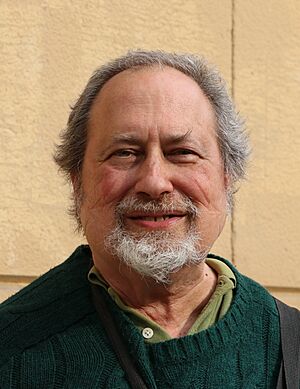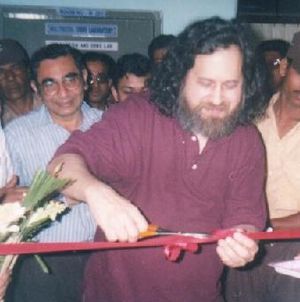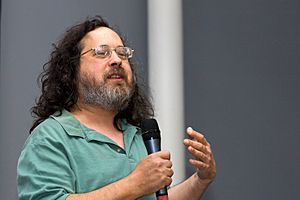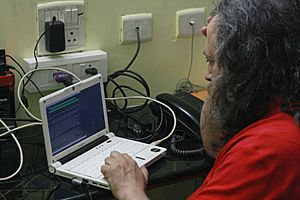Richard Stallman facts for kids
Quick facts for kids
Richard Stallman
|
|
|---|---|

Stallman in 2024
|
|
| Born |
Richard Matthew Stallman
March 16, 1953 New York City, New York, U.S.
|
| Other names | rms (RMS) |
| Education |
|
| Occupation |
|
| Known for | |
| Awards |
|
| Signature | |
 |
|
Richard Matthew Stallman (born March 16, 1953), also known as rms, is an American computer programmer and activist. He is famous for starting the free software movement. This movement believes that computer users should have the freedom to use, study, share, and change the software they use. Software that gives these freedoms is called "free software."
Stallman started the GNU Project in 1983. This project aimed to create a complete computer operating system made entirely of free software. He also founded the Free Software Foundation (FSF) in 1985. He helped create important software like GNU Emacs and the GNU Compiler Collection. He also wrote the GNU General Public License, which is a special legal document that helps keep software free.
Stallman came up with the idea of copyleft. This is a clever way to use copyright law to make sure software stays free. It means that anyone who gets a copy of the software can use it, change it, and share it, as long as they also share their changes under the same free terms.
Since the 1990s, Stallman has spent most of his time speaking up for free software. He also campaigns against things that he believes take away users' freedoms. These include software patents and digital rights management (DRM), which he calls "digital restrictions management."
In 2019, Stallman stepped down as president of the FSF. However, he remained the head of the GNU Project. In 2021, he returned to the FSF board of directors.
Contents
Early Life and Computer Adventures
Richard Stallman was born in New York City on March 16, 1953. He became interested in computers at a very young age. When he was a pre-teen, he read manuals for early computers like the IBM 7094.
In 1970, after high school, he got a summer job at the IBM New York Scientific Center. He wrote programs and even created his own text editor. This was his first hands-on experience with computers.
Learning at Harvard and MIT
In 1970, Stallman started studying at Harvard University. He was very good at math. In 1971, he also began working as a programmer at the MIT Artificial Intelligence Laboratory (AI Lab). Here, he became part of a group of skilled programmers known as "hackers." He was often called "RMS" by his friends there.
Stallman earned his physics degree from Harvard in 1974. He then went to the Massachusetts Institute of Technology (MIT) for a year to study physics. But he soon decided to focus completely on programming at the MIT AI Lab.
At the AI Lab, Stallman worked on important software projects. He helped create the Emacs text editor. He also worked on operating systems for special computers called Lisp machines. He believed that everyone should have access to computer systems. When MIT's computer lab added a password system in 1977, Stallman found a way to help users remove their passwords. He wanted to keep the systems open for everyone.
Why the GNU Project Started
In the late 1970s and early 1980s, the way software was made and shared began to change. Companies started to keep their software's "source code" (the human-readable instructions) secret. They used copyright laws and special licenses to stop people from copying or sharing their software. This kind of software is called "proprietary software."
Stallman believed this change was wrong. He felt that users should always be able to share and change the software they use. He called it "a crime against humanity" when software was designed to restrict users' freedom.
A key moment for Stallman happened in 1980. He and other programmers at the AI Lab couldn't get the source code for a new laser printer. Stallman had previously modified the old printer's software to make it more helpful. For example, it would tell users when their print job was done or if the printer was stuck. Not being able to add these features to the new printer showed him how important it was for people to be able to change their software.
In 1982, a company called Symbolics hired many programmers from the AI Lab. These programmers then created proprietary software. Stallman worked alone for two years to create his own versions of their programs. He wanted to stop Symbolics from having a complete control over the lab's computers.
Stallman believes that sharing software is like sharing recipes or ideas. He argues that it's wrong for companies to stop people from sharing or changing software. He says that freedom is a moral value for users and society.
In February 1984, Stallman left his job at MIT to work full-time on the GNU Project. He had announced this project in September 1983.
The GNU Project
Stallman announced his plan for the GNU operating system in 1983. He wanted to build a computer system that was completely free. He said, "As an operating system developer, I had the right skills for this job." He decided to make GNU work like the Unix system, so it would be easy for people to switch to it.
In 1985, Stallman wrote the GNU Manifesto. This paper explained why he was creating GNU, which stands for "GNU's Not Unix." Soon after, he started the Free Software Foundation (FSF). This non-profit group helps support the free software movement. Stallman was the FSF's unpaid president.
Stallman made the idea of copyleft popular. This legal tool helps protect the rights to change and share free software. The first version of the GNU General Public License (GPL) was released in 1989. This license is now the most widely used free software license.
Stallman helped create many important tools for the GNU system. These include the GNU Emacs text editor, the GNU Compiler Collection (GCC), and the GNU Debugger. The GNU project still needed a "kernel," which is the core part of an operating system.
In 1991, a student named Linus Torvalds created the Linux kernel. He used GNU's development tools to do this. The existing GNU programs could easily run on this new kernel. Most people call this combined system "Linux." However, Stallman and the FSF call it "GNU/Linux." This is because the GNU project created most of the system, and Linux is just one part of it. Stallman believes using "GNU/Linux" helps people remember the free software ideas behind the project.
Stallman's work also influenced the names of other computer standards, like POSIX. His Emacs editor was very popular, leading to friendly "editor wars" with another editor called Vi. Stallman even joked about it, calling himself "St. IGNUcius of the Church of Emacs."
In 2019, some GNU project leaders said that Stallman's behavior had "undermined a core value of the GNU project." This happened after he resigned from the FSF board. However, he continued to lead the GNU project.
Speaking Up for Freedom
Stallman has written many essays about software freedom. He has been a strong supporter of the free software movement since the early 1990s. He often gives talks about the GNU Project, the dangers of software patents, and copyright in the digital age.
In 1999, Stallman suggested creating a free online encyclopedia where people could contribute articles. This idea led to a project called GNUPedia, which later merged with Wikipedia.
In 2006, Stallman met with officials in the Indian state of Kerala. He convinced them to switch schools from using proprietary software like Microsoft Windows to a free software operating system. This was a big decision that affected 12,500 high schools.
Stallman has also met with leaders like the former president of India, A. P. J. Abdul Kalam, and the president of Ecuador, Rafael Correa. He has encouraged them to support the free software movement.
He often protests against software patents and digital rights management (DRM). In 2006, he protested against a company called ATI for not sharing their hardware information. Later, AMD bought ATI and started to share more information with the free software community.
Stallman believes that companies like Apple, led by Steve Jobs, have created "closed platforms." This means users have less control over their devices and software. He uses computers that can run entirely on free software, even at the lowest levels. He once said, "freedom is my priority."
Thoughts on Copyright
Stallman often gives talks called "Copyright vs. Community." In these talks, he discusses the problems with DRM and explains why he avoids certain products and companies. He suggests that copyright should be much shorter, perhaps only 10 years. He believes that people should be able to share copies of works for non-commercial reasons without it being a copyright violation.
He has even refused to sign anything with a copyright symbol (©) on it. He helped the International Music Score Library Project get back online after it was taken down due to copyright issues.
Stallman also talks about the problems with e-books and devices like the Amazon Kindle. He says that these devices can prevent copying, lending, or selling books, and can even allow companies to delete books remotely. He believes this takes away freedoms that people have with paper books. His short story "The Right to Read" describes a future where sharing books is almost impossible. He also dislikes technologies like DVDs and Blu-ray discs because their content is often encrypted to control how users view them.
He sees the Sony BMG copy protection rootkit scandal as a criminal act by Sony. He also worries that governments might encourage "software as a service" (where you use software over the internet) because it could allow them to access users' data without a search warrant.
Important Words
Stallman believes that the words we use are very important. He asks people to say free software and GNU/Linux. He also asks people to avoid terms like intellectual property and piracy when talking about copying software.
He argues that "intellectual property" is a confusing term. It groups together different laws like copyright, patent, and trademark, which have different purposes. He says this term makes it harder to have a clear discussion about these laws.
Free Software vs. Open Source
Stallman prefers the term free software over open-source software. He says that "free software is a political movement; open source is a development model." He believes that "free software" clearly shows that the most important thing is freedom, not just how the software is made. He accepts "software libre" as another good term. He also prefers proprietary software or non-free software instead of closed-source software.
Linux and GNU
Stallman asks people to use the term GNU/Linux when talking about the operating system that combines the GNU system with the Linux kernel. He says that the GNU Project developed most of the system. He believes that calling it just "Linux" hides the important work of the GNU Project and its philosophy of freedom. He sometimes uses "GNU+Linux" to make it clear that GNU is the main part. However, Linus Torvalds, the creator of Linux, prefers to call it just "Linux."
Privacy and Surveillance
Stallman admires people like Julian Assange and Edward Snowden who have spoken out about privacy. He often talks about the dangers of government and company surveillance.
He calls mobile phones "portable surveillance and tracking devices." He refuses to own a cell phone because there are no phones that run entirely on free software. He also avoids using key cards to enter buildings because they track where and when someone enters. He often uses special methods to browse the internet anonymously to protect his privacy.
Personal Life
Stallman lives in Boston, Massachusetts. He speaks English, French, Spanish, and some Indonesian. He has said that he is an atheist of Jewish heritage. He is also childfree, meaning he has chosen not to have children.
Stallman has written many parody songs, often about computers and freedom.
In September 2023, Stallman shared that he was diagnosed with a type of cancer called follicular lymphoma. He said that his doctors believed his prognosis was good, and he was receiving treatment.
Honors and Awards
- 1990: MacArthur Fellowship ("genius grant")
- 1990: Grace Murray Hopper Award for his work on the Emacs editor
- 1996: Honorary doctorate from Sweden's Royal Institute of Technology
- 1998: EFF Pioneer Award
- 2001: Takeda Techno-Entrepreneurship Award
- 2001: Honorary doctorate from the University of Glasgow
- 2002: US National Academy of Engineering membership
- 2003: Honorary doctorate from the Vrije Universiteit Brussel
- 2004: Honorary doctorate from the Universidad Nacional de Salta
- 2015: ACM Software System Award for leading the development of GCC
- 2016: Honorary doctorate from Pierre and Marie Curie University
See also
 In Spanish: Richard Stallman para niños
In Spanish: Richard Stallman para niños
- Free Software Street
- GNU
- History of free and open-source software
- Revolution OS
Images for kids
 | Janet Taylor Pickett |
 | Synthia Saint James |
 | Howardena Pindell |
 | Faith Ringgold |




